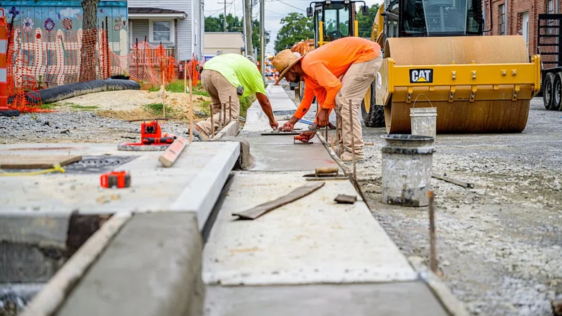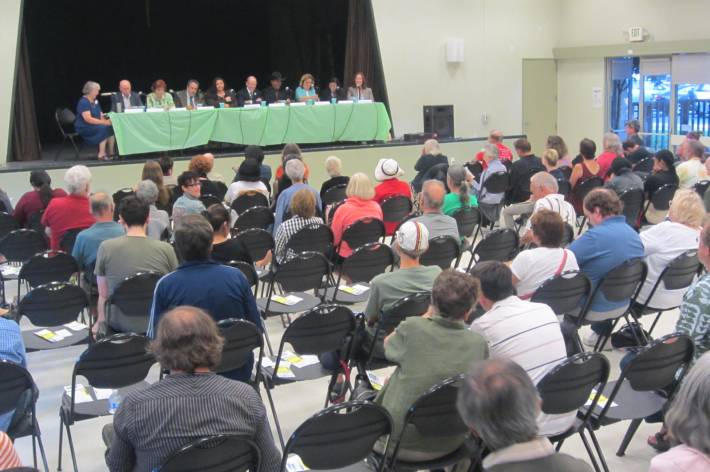
A crowded field of nine candidates campaigning for three available seats on Mountain View's City Council aired their disagreements at a community forum on Tuesday evening about whether new housing within the sprawling North Bayshore office park would be a practical solution to traffic congestion and rapidly rising rents.
Candidates Lenny Siegel, Pat Showalter, Jim Neal, Gary Unangst and Ken Rosenberg expressed support for a proposal put forth by city planners in 2011 to allow housing units to be included in future development projects along Shoreline Boulevard, as a way to reduce the need for so many North Bayshore employees to drive to work. Candidates Margaret Capriles, Lisa Matichak, Mercedes Salem, and Ellen Kamei disagreed, stating that North Bayshore lacks sufficient transit and other services that support residential neighborhoods.
The booming office district, located between Highway 101 and the Bay at Mountain View's northern end is home to Google, LinkedIn, Intuit, and a number of smaller tech companies, bringing over 17,000 workers -- one-fourth of all jobs in Mountain View -- every weekday. The city's 2012 General Plan allows an additional 3.4 million square feet of commercial development in North Bayshore, which would bring an estimated 10,500 additional weekday commuters to the area if built.
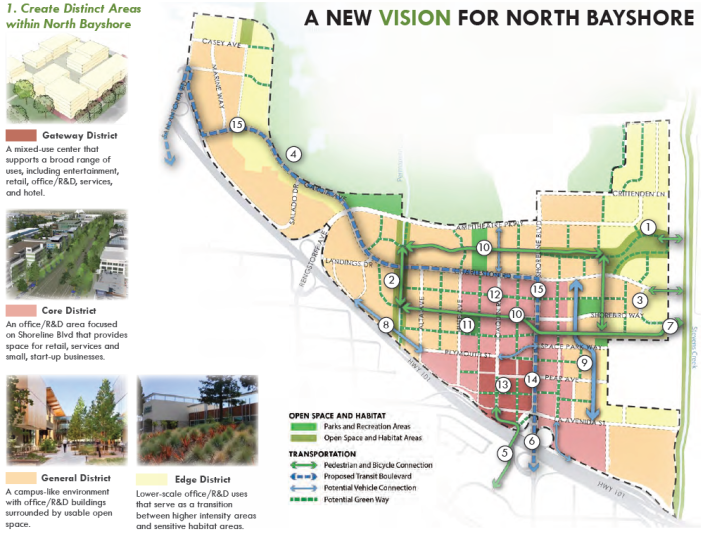
A detailed set of transportation investments for the area has been proposed to accommodate this growth, including roadway capacity increases, improvements to transit, bicycling, and walking, and a cap that would prohibit additional development if vehicle trips exceed a certain level. But the challenge of shuttling up to 27,500 people into and out of the area on a daily basis has been exacerbated by the City Council's 4-3 vote in July 2012 to remove mixed-use development from the General Plan, thus prohibiting any new housing from being constructed amongst the offices.
"We believe that planning for a wide range of land uses -- including a "critical mass" of residential uses -- in North Bayshore is one of the best ways to reduce vehicle miles traveled and manage auto traffic congestion in this area," wrote Valley Transportation Authority (VTA) Deputy Director of Planning Chris Augenstein in objection to the city council's decision.
Since none of the four city council members who voted against mixed-use development in North Bayshore in 2012 (Jac Siegel, Margaret Abe-Koga, Ronit Bryant, and Laura Macias) will still be serving on the council in January 2015, the decision could be reversed depending on which three candidates voters elect on November 4.
Lenny Siegel, Showalter, and Unangst all touted the environmental benefits of moving away from the city's unsustainable single-use zoning practices and towards permitting more housing near jobs. Neal and Rosenberg also spoke in support of housing in North Bayshore.
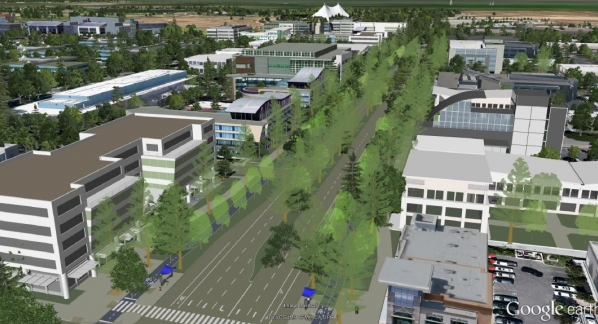
"To me it's a no-brainer," said Siegel, suggesting that up to 5,000 residential units be planned for the area. He proposes a "mid-rise, medium-density, compact community with a good balance of jobs, housing and local services, including cafes, shops, educational facilities, and at least one supermarket," according to his Campaign for a Balanced Mountain View website.
"Housing near jobs is the future," said Unangst. "It dramatically decreases the distances of commutes and therefore the emissions of carbon dioxide. We've got to get away from these long commutes." Showalter agreed. "We should be adding housing in North Bayshore," she said. "The emissions that we would save by having people live closer to their work, it's just tremendous."
"I say definitely put housing out there," said Neal, who emphasized that it could be designed around the needs of the area's large employers. Rosenberg also described the need to house more of the area's workers locally. "Residents have been asking for it, but also our corporate residents are asking for it, and we should listen to them as well," he said.
Google and other large employers want to provide their workers with the option of walking or bicycling to work, which would make it easier for them to recruit and retain workers who prefer living close to work and avoiding long commutes.
"Mixed-use development provides access with less impact on transportation systems," wrote Google's Director of Real Estate, Design, and Construction John Igoe in 2012, when the city council proposed prohibiting the construction of housing in North Bayshore. "The proposal to remove residential from the major employment center in the area will further burden the transportation system." Igoe reiterated Google's support for housing near its office buildings at the city's Environmental Planning Commission meeting on Wednesday evening.
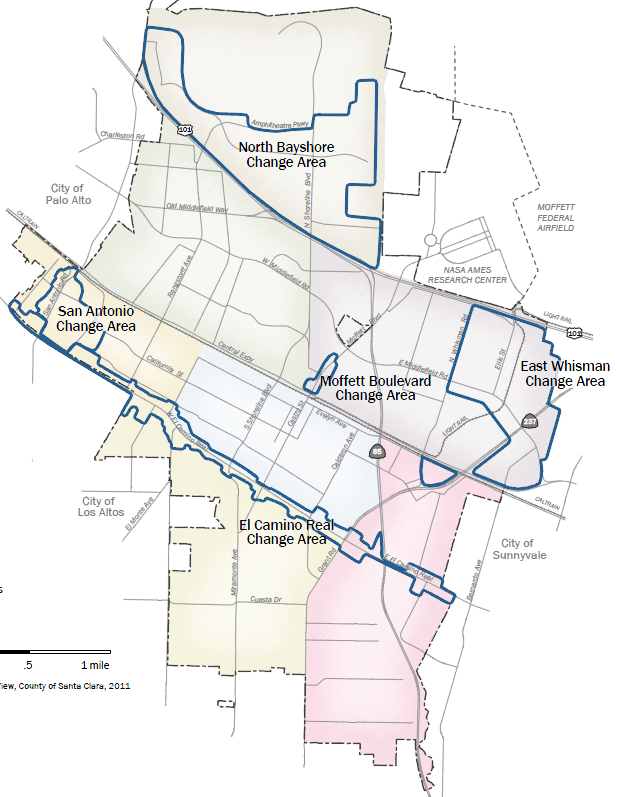
"[Google] would support the eventual growth of the number of housing units there to approximately 5,000 units, whatever is needed to create a community. There'd be retail there in support of it," Igoe said. "1,100 units of housing are equivalent to 500,000 square feet of office, from a traffic reduction standpoint," he said, referring to a June 2012 traffic study that found that amount of housing would reduce vehicle miles traveled and greenhouse gas emissions by roughly the amount that would be generated by 500,000 square feet of new office space there.
But four candidates in November's city council election, Margaret Capriles, Lisa Matichak, Ellen Kamei, and Mercedes Salem, disagreed on the need to pursue mixed-use development in North Bayshore, citing a "lack of services" to support a new neighborhood on the Bay side of Highway 101.
"Want I want to know is, if we put a community out there, is it sustainable over time?" asked Capriles. "We don't have transportation out there, and we don't have services."
"I don't feel that housing makes sense in North Bayshore. It lacks services and amenities currently to support housing," said Kamei. "One goal is to reduce single occupancy vehicle trips to that area to 45 percent. Before we look at any type of housing, it's important to reach these transportation goals."
Salem was even more certain that a North Bayshore neighborhood would be doomed to fail. "We're pre-supposing that the people who are going to live in the housing units there are going to work in the big companies that already provide them everything they need," she said. "They're not going to be at the Safeway, they're not going to be at the restaurants. And those businesses will not thrive."
Matichak attended the candidate forum as well but left for another meeting before the question on North Bayshore was asked. She has previously stated her opposition to housing in the area.
All candidates agreed on the need for better and more frequent transit service to North Bayshore and elsewhere in Mountain View, no matter how much office or housing development occurs. Unfortunately, they all also spoke against the concept of dedicated bus lanes on El Camino Real, which VTA says will speed up bus commutes between Palo Alto and downtown San Jose by 50 percent during rush hour, and boost transit ridership in the corridor (including Caltrain) by up to 40 percent over the next 25 years.
Specific transit expansion plans will be discussed at two meetings this week. VTA will present its North Central County Bus Improvement Plan, about improving bus service on north-south routes between the future El Camino Real and Stevens Creek Boulevard bus rapid transit lines, at a community meeting at Sunnyvale City Hall on Tuesday, September 9. TransForm and other non-profit groups are hosting a panel discussion on the El Camino Real Bus Rapid Transit (BRT) project on Thursday, September 11.


